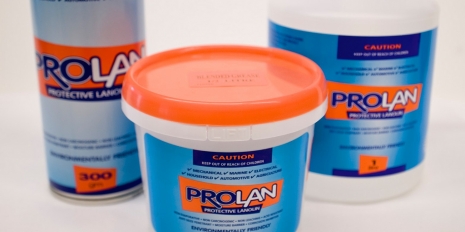
The following article is from Graham Skellern at the Bay of Plenty Times covers Iocal company Prolan and the innovative project undertaken by Locus Research and Ag Research
The article can be found at: http://www.bayofplentytimes.co.nz/news/success-grows-on-woolly-backs/1136260/
In this technological world, some people have suggested that the days of living off the sheep's back are well and truly over.
An ambitious Omokoroa husband and wife team have proved that to be a fallacy.
Murray and Julie Shaw, trading as Aria Investment, are using the natural grease from the sheep's wool and turning it into groundbreaking Prolan-branded lanolin lubricants for rust protection in sectors including wind turbines, mechanical, marine, industrial and households.
Just over a month ago, the Shaws took an order that almost doubled their exports to Denmark - after nine months of research and development to improve their product for that market.
"We had steady growth in Scandinavia but on cold days in the winter the grease got too hard, and our liquid spray left a tacky surface and collected dust," said Mr Shaw, director of Prolan NZ. Julie Shaw, a former medical laboratory technologist, is the managing director.
"We had to develop new products to enable our distributor to keep his markets.
"If we hadn't done that, the exports might have fallen over," he said.
The Shaws obtained a matching grant from TechNZ and worked with AgResearch and Mount Maunganui-based Locus Research to produce a softer grease and less tacky liquid spray. The grease can handle temperatures of zero degrees Celsius, and provide long-lasting protection.
In August, the Shaws filled an order of 14 drums of Prolan grease, containing a total of 2800 litres, and 250 pails of liquid spray, or 125 litres, for its distributor Denrex Aps, based in Mariager in central Denmark.
Denrex's previous order in February was eight drums of grease.
The distributor is supplying the New Zealand-made product into Sweden and Norway.
"We smiled all the way and we couldn't make it quick enough when we received the latest order," said Mr Shaw, a former engineer.
"The indication from our distributor is that we are biting the end of the tail.
"He reckons the products will take off in the next 12 months and I wouldn't be surprised if his order doubles again."
Denrex is sending the lanolin lubricant to Furuno, a leading company in marine electronics, Vesta Wind Turbines, Copenhagen Airport and the Danish Air Force.
A Swedish company is also testing the grease as a protectant for double glazed windows to stop water tracking between the glass.
"The lanolin sticks to stainless steel, and other material, like you wouldn't believe. It stops electrolysis, forms a barrier and prevents corrosion," Mr Shaw said. "Saltwater won't break it down and water blasting won't take it off.
"It's environmentally friendly and straight off the sheep's back. You haven't seen a rusty sheep, have you? The product fits in well in Scandinavia; they are very green, even cleaner and greener than us environmentally," he said.
At the moment, Prolan NZ - based just off the main road near the Omokoroa Beach turnoff - is producing about 12,000 litres of the lubricant a year, and a quarter of that is exported to Denmark and the Pacific Islands, particularly New Caledonia.
The Shaws are now looking for export growth by stepping up their marketing operations.
The remainder of the product is sold in New Zealand, online and through distribution outlets such as Farmlands, Bay Engineers, Anzor Fasteners, and Trans Diesel.
The Shaws source the natural product from the Lanolin Trading Company in Christchurch and select the honey-coloured grease from the wool collected from the sheep farms in the central North Island and Hawke's Bay.
"The lanolin changes the further south you go, where it becomes black," Mr Shaw said.
The Shaws melt the lanolin in vats at their Omokoroa processing plant and blend it with natural food grade oils.
They produce 1000-litre batches at a time - and it took them two and a half weeks to get through the last Danish order.
The liquid spray is sent to a new firm just south of Napier for filling into aerosol cans.
The lanolin product has proved to be useful as an anti-seize lubricant for padlocks, hinges, chains, frames, bolts, nuts, threads, and a corrosion inhibitor for vehicles, tools, quad bikes, trailers, boats, machinery, particularly when it comes to battery connections and starter motors.
Even the Department of Conservation has become interested. Staff in Queenstown have been using the Prolan liquid, with another additive, to spray on to sheep and stop keas from attacking them.
That's doing a full circle.
Prolan NZ kicked into gear in 2005 after Mr Shaw, a fitter and turner by trade, worked for Page Macrae Engineering at the Mount for 15 year; he was operations manager for four years.
"I was working with petrol chemical-based products and I thought there was a good opportunity for lanolin. The world was becoming more environmentally friendly.
"Julie's father had a cousin in Australia who told him lanolin products were going well over there.
"I decided I could do the engineering side of it, and away we went. We are going for it now," said Mr Shaw.